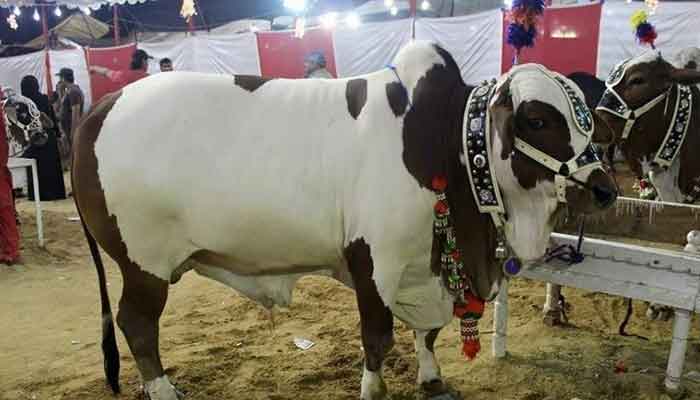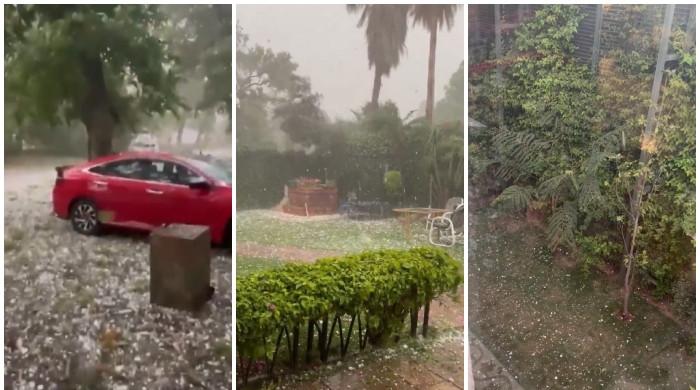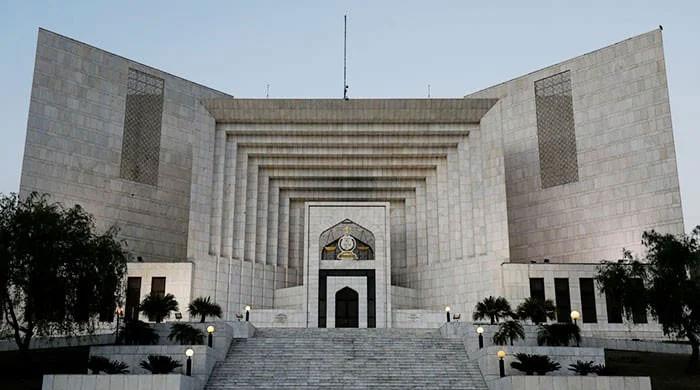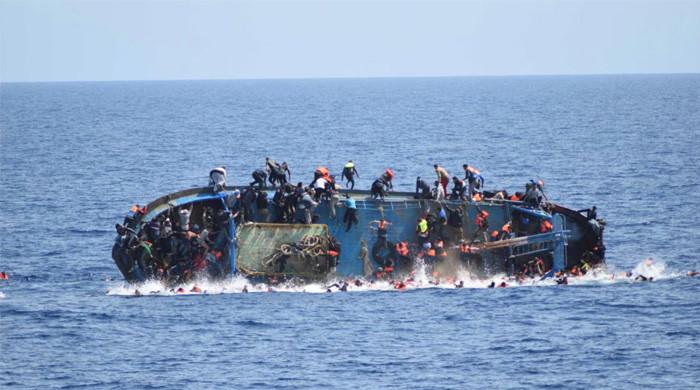Eid ul Adha 2020: Guidelines for prevention of coronavirus
The health ministry has advised against hugging on Eid to curb the spread of COVID-19
July 25, 2020

The National Institute of Health, in a bid to curb the spread of coronavirus, has issued the guidelines for Eid-ul-Azha, which will be observed on August 1 (Saturday).
”The animal markets to be set up around the time of Eid must adhere to these guidelines for social distancing and protective measures to be practised for preventing the spread of infection among the sellers and buyers and to ensure the safe Eid during the COVID 19 outbreak,” the document issued read.
The NIH also said that the masses should keep their travelling minimum and refrain from crowding the markets as was witnessed during Ramazan.
“Every person should bring his own prayer mat for Eid prayers,” the advisory stated and discouraged children and the elderly from attending the prayers.
Social distancing at animal markets/mandees
Local Authority
- The local authorities should encourage the trend of online buying, e-selling and slaughter arrangements of the animals as much as possible in there cities/towns
- The authorities should allocate large enough spaces away from general populated areas for animal markets/mandees
- Local authority must get the markets set under their supervision while allocating the space to the animal vendors strictly following physical/social distancing principals
- Local authority must ensure that every individual visiting the market (buyer/seller) must wear face mask as per the government’s orders. Those without face masks would not be allowed within the market/ mandee
- Local authority must ensure the availability of thermal guns at entrance and allow customers only after checking temperature
- Local authority must designate an individual at the entrance and exit of the market with alcohol-based hand sanitizer (at least 70% alcohol) who must make sure each customer sanitises his hand before entering and while leaving the market
- Do not allow the customer with cough and flu to enter the market
- To ensure the space does not get crowded, allow people to enter the market only in small groups at intervals
- Local authority must inspect the adherence to the guidelines by the sellers and buyers during the business hours
- Ensure the public display of notices promoting hand hygiene and social distancing
- A medical aid post/first aid post should be identified for medical advice if needed by the customers/sellers within close proximity of the animal market/mandee
Animal vendors/ sellers
- Every seller must wear the face mask as per the government’s order
- The seller should wash hands with soap and water frequently or use an alcohol-based (70%) hand sanitizer
- The seller should set up their stalls at a distance of at least 2 meters from each other while having adequate space for their own animals. The supporting arrangements must be made by the local authority
- Seller and customers should maintain the safe distance of 2 meters among each other
- Seller and customer must not shake hands or maintain any other physical contact
- The seller must keep a disinfection formulation with 0.5% diluted bleach or 60%-80% dilute alcohol solution to disinfect the most frequently used surfaces by the customers
- Each salesperson must ensure the use of gloves for touching the animals
- Any seller, if sick or have symptoms such as cough, fever etc., is not allowed to sell animals in the market. He must arrange a replacement for him otherwise he is not allowed to be present personally
- Each seller must ensure queue control and maintaining the advised 2 meters distance in his allocated space in the market/ mandee
- The sellers must keep themselves updated with the updated instructions issued by the government and show strict compliance to them
Customers/ Buyers
- The buyer must wear a surgical/medical mask as per the government orders
- Do not go to the market/ mandee if you are suffering from fever, cough or flu
- Make sure to sanitize your hands before and after visiting the market/ mandee
- Do not touch animals without gloves
- Avoid touching the surfaces in the market/ mandee unnecessarily
- Maintain 2 meters distance from salesperson or other customer within the market/ mandee
- Follow the safety guidance provided by the local management and cooperate with the staff
- If you observe no compliance to the guidelines by the individual seller, play your responsible role as a citizen and inform the local authorities
Social distancing and infection prevention & control during slaughtering of animals
General prevention measures
The preventive measures that should be followed during slaughtering activity are:
- The site of slaughtering should be away from general public and living areas
- Crowding at slaughtering should be avoided, only necessary persons should be allowed to be present at the site
- Practice physical distancing. Maintain a minimum 2-meter distance
- Promote good respiratory hygiene. Cough or sneeze into bent elbows. If not, a disposable tissue should be used to cover mouth and nose when coughing or sneezing, then thrown in a bin with a lid. Perform hand hygiene after disposal
- Avoid touching eyes, nose or mouth, especially when hands are not clean
- Use gloves and masks. PPE provides a barrier to protect the person from potential exposure to hazards
- Wash your hands frequently with soap and water for 40-60 seconds. If soap and water are not available, rub your hands for 20-30 seconds with an alcohol-based hand sanitizer that contains 60-80% alcohol
General cleaning and disinfecting principles
Environmental cleaning and disinfection procedures should be followed consistently and correctly before and after the slaughtering of animals.
- Cleaning with detergent and water, followed by rinsing and drying, is the most useful method for removing germs from surfaces. Enveloped viruses, including the one causing COVID-19, are sensitive to detergents. Detergents help to loosen the germs so that they can be rinsed away with clean water
- Disinfecting or using chemicals to kill germs on surfaces, can further lower the risk of spreading infection. After applying a disinfectant, wait for the required exposure time to ensure it kills germs on the surface. Once the contact time has lapsed, the disinfectant may be rinsed with clean water
- Where possible, use disposable cloths/ towels and disposable mop heads. Alternatively, ensure used cloths and mop heads are laundered and dried after use to minimize contamination
General preventive measures for Eid prayers
- Separate entrances and exits should be made in a one-way system to prevent bottlenecks
- Thermal screening for all worshippers at entry points of eidgah
- Hand sanitizer at entrances/exits, making it mandatory for all people to use it before entering and after exiting
- Every person should wear face/surgical mask
- Mark out prayer spaces clearly using measuring instruments to make social distancing of 6 feets easy to follow
- Worshippers should bring their own prayer mats
- Encourage people to perform wudhu at home
- People must maintain social distancing by keeping 2 meters distance between each other, and every other row should be left empty to allow for 2 meters spacing in all directions
- Discourage the sick & elderly and children under 15 years of age from attending prayers
- Discourage the socializing and embracing within the eidgah after prayers
- Allocate COVID-19 safety officer on both male and female side
Eid Prayers in Mosques
- Screening for all worshippers at gate of mosques
- Provision of hand sanitizer at gate of mosques
- The waiting time between the call to prayer and the actual prayer is limited to 10 minutes in order to avoid overcrowding.
- Mosques must close no later than 10 minutes after the prayer ends.
- Imams should deliver the sermons on the topic of the virus and preventative measures that government of Pakistan has taken in order to slow the spread to give individuals an active role in promoting the health and safety of the members of society
- Windows and doors of the mosques should be kept opened for good ventilation during the duration of the prayer
- No carpets or mats to be laid down in mosques because the virus is airborne
- Clean floors for prayers must be ensured by washing them with chlorinated water regularly
- Every person should wear face/surgical mask
- Worshippers should bring their own prayer mat and not leave them behind after the prayer
- Encourage people to perform wudhu at home
- People must avoid handshake
- Hard copies of the Holy Quran and other books must be removed
- Worshipers must maintain social distancing by keeping two meters distance between each other, and every other row should be left empty
- Water coolers should not to be used
- Restrooms and ablution sections must be closed avoid crowding when entering or exiting the mosques.
- Discourage the sick & elderly and children under 15 years of age from attending prayers
- Discourage the socializing within the mosques after prayers











